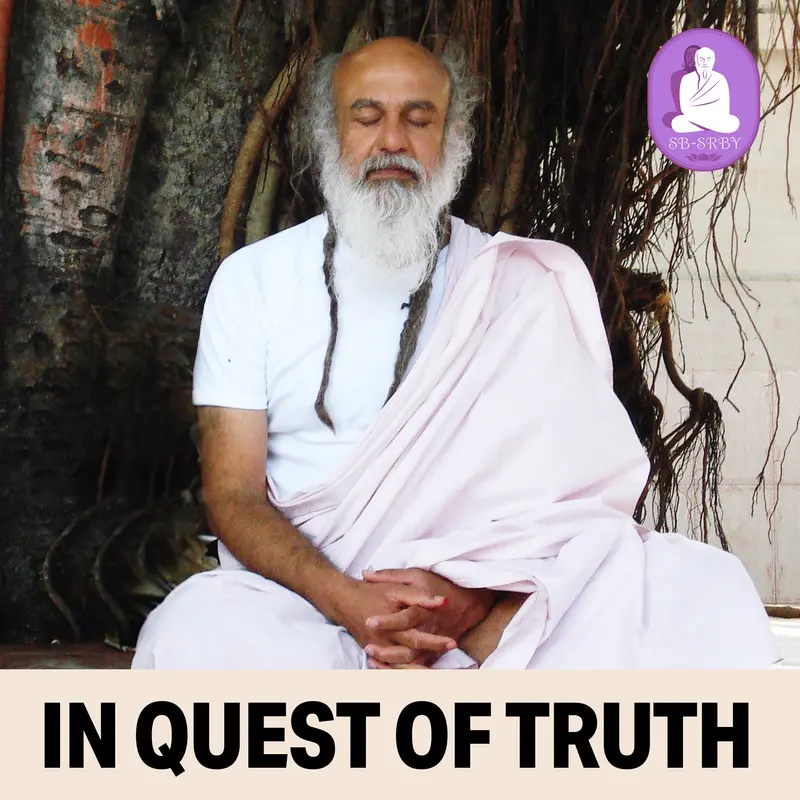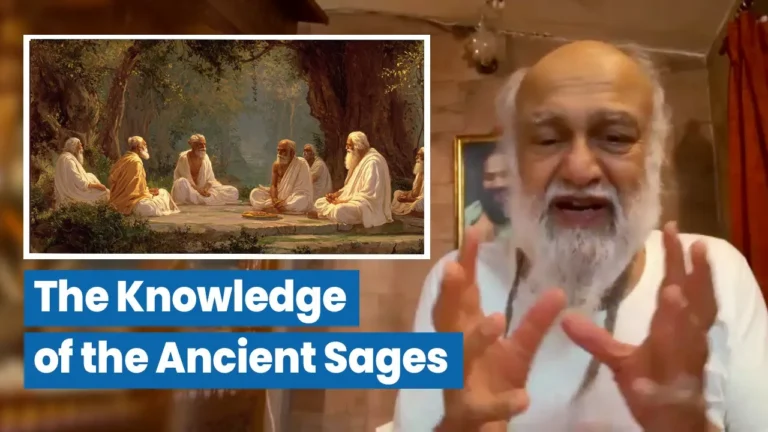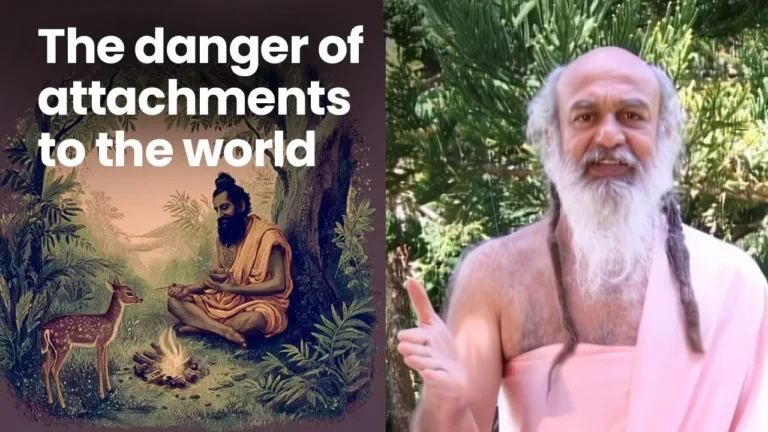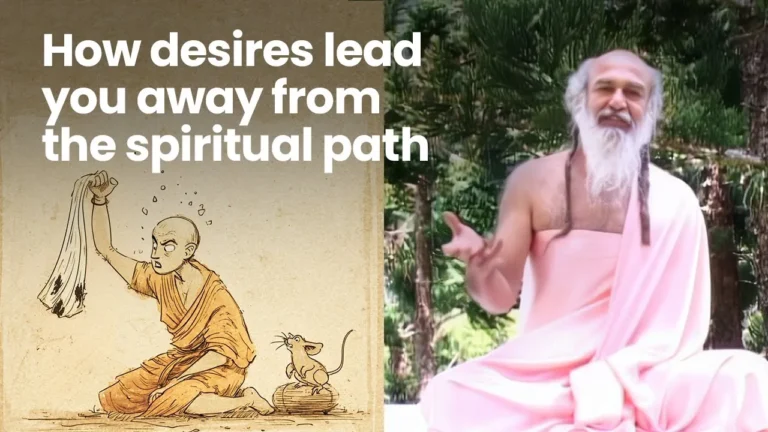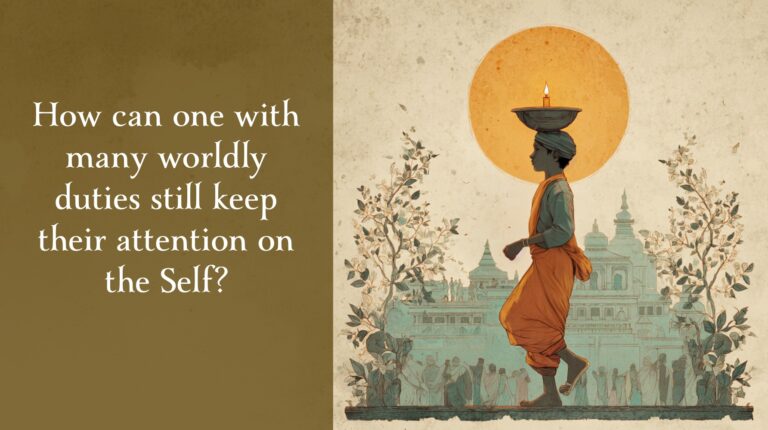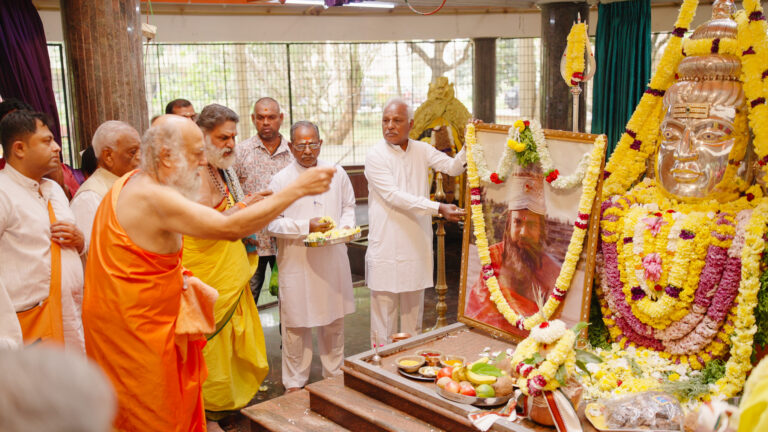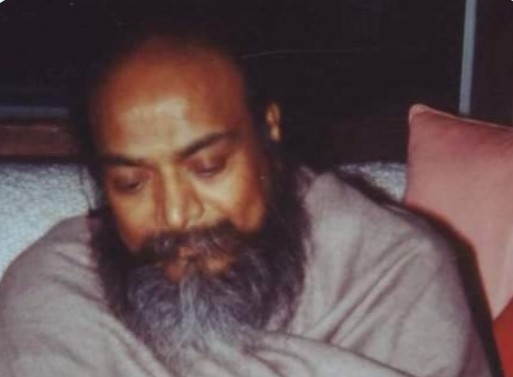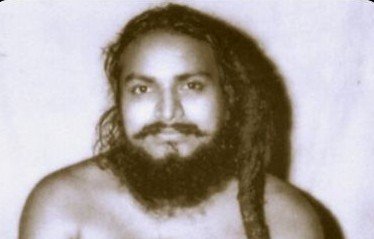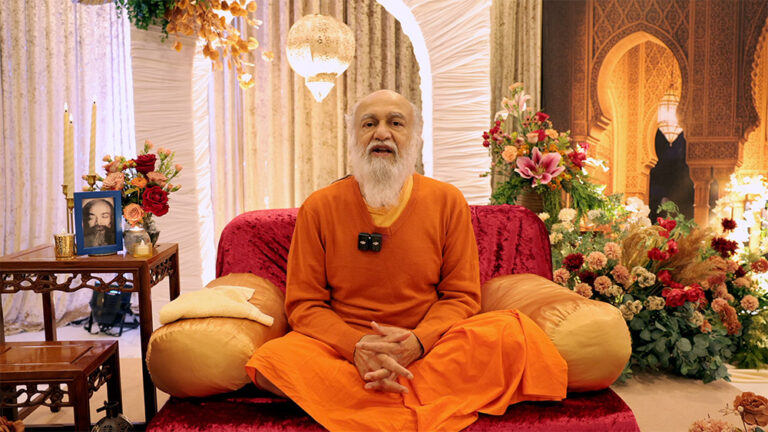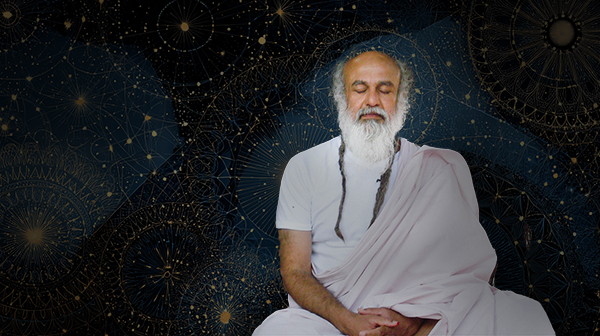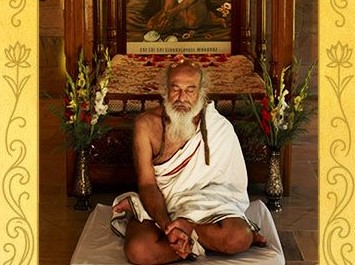Recorded on 15 January 2022 with worldwide participants
0:00 Introduction
0:16 What is selfless service?
1:46 Can one become Self-Realised through the practice of selfless service?
3:32 What can we do to make our service selfless service?
10:00 When we serve relatives, friends and others, how we do we make sure we are not exploited?
12:39 If people perform genuine selfless service to others without considering it a spiritual practice, could they become Realised without intention?
15:35 How do we offer our services to God?
17:06 How do we recognise when someone is in real need, that we can assist rather than simply interfering?
17:51 If one is asked by anyone to be involved in an action that we believe is morally wrong, are we justified in ignoring that request?
19:08 Can it be right to tell a lie or is it always important to tell the truth?
22:18 What is self respect and does it conflict with selfless service?
30:10 Is the instant response to help an ego or is it compassion?
31:44 What advice to give on assisted suicide?
34:30 What is the technology that enables the quiet mind to make good judgments?
Service & Helping Others Thus Spake Babaji – online Q&A, No 99
15 January 2022, Worldwide Participants
Questioner:
What is selfless service?
Babaji:
A service without any expectations. Just ready to accept any results.
Say, when you serve, somebody might appreciate your services, others also may appreciate, and many may not recognize at all, and even some pass on sarcastic remarks, criticizing, any such things can come. So if you are doing without any expectations, just for sake of service, and that is the selfless service. That only can serve like a sadhana for you, because your mind will become quiet. That is the purpose of meditation, silencing the mind. So it won’t have any expectations, any desires, just as a witness you do that work as if you are at the Lotus Feet of the Master, and if you are listening to the Divine’s wishes, or just obeying any command of your commander or a boss, anything like that. You don’t have to–you don’t bother, ‘Why I have to do this, why not this’, like that. So, then such a thing gets converted as a sadhana. That is what is selfless service I mean.
Same Questioner:
Can one become Self Realized through the practice of selfless service?
Babaji:
Yeah, an awareness comes, because as the mind becomes quiet, slowly it will lose a desire of its own, and any expectations of its own – just becomes quiet. And when it becomes quiet, automatically its awareness turns to itself. And you will also realize, mind as yourself actually. Mind is not a separate entity somewhere.
Though we tend to call, ‘your mind, my mind, this mind, that mind,’ like that. So it is not as a separate organ. Like, in the body we can call things as a separate organ. Like a brain is here located, it is our physiological-biological organ, our kidneys are located, hands, eyes, sensory organs, like that. But its mind is all one single-self. That same thing.
Means you were imagining, and you got involved into that imagination for long time, became habitual. And now you stop that imagination because you don’t have any desire, everything is just alright. As long as the body is there, alright, you just take care of the body. Means everything you go on doing as a witness. When you are just a witness, there is nothing that you have to gain or lose, then the mind becomes quiet. So thus, an awareness of the Self can come, so that some people have Realized.
Same Questioner:
What can we do to make our service selfless service?
Babaji:
Yeah, if you have expectations that somebody need to see, or appreciate, understand, and you should not brood the world is thankless, you did so much to this world, but yet nobody is ready to recognize, understand, or appreciate. So that is selfishness. You had some ideas, some expectation only, then you wanted to do it.
Otherwise, if it is glamorous, many people may come and become a monk in the Ashram if it is glamorous, if then it can be attractive. If it is just…say, suppose we announce, ‘You just have to dust and mop in the Ashram, are you willing to come as a brahmacharya, as a bachelor, and would like to join as a resident of the Ashram?’ Hardly anybody will be interested.
So that’s what is needed actually, just needed. The first day itself when Swamiji came here, remember I have always repeatedly said that ‘if you clean the toilets of the Ashram you will know the essence of Bhagavad Gita’, means great Upanishad teachings you will understand. To become egoless, and not to have any such expectations. Just for sake of service you do service, everything. You go in quest of knowledge for sake of knowledge. You serve the Master just for sake of serving. That’s all, you don’t need anything else in return. That’s what the thing is. Then only this thing can happen, a selfless service can happen.
If a selfless service happens, mind becomes quiet – that’s important. Mind becoming silent, that’s what you have to achieve. If not sitting and just watching, if you want to be active, and want to serve.
Like another word important that Swamiji always spoke, ‘If you live for yourself, its life, if you can live for others.’ Living for others, not necessary that physically you have to go out and do every work. So if you can mentally just keep quiet at home also, that will serve the purpose. That is another thing. But if it is in your temperament, you want to do such work, such services, if it suits you, then you can do it. But when you do it, do it silently, just as a service to the Master, as a service to the Divine, and you try to see the same Divine without any expectations, and without any brooding, without any imaginations at all – then the mind becomes quiet if such a thing happens.
So when we came to the Master fifty years ago, forty seven years ago, we didn’t have any idea, ‘What am I going to do in the Ashram?’ I just wanted to come, that time mind was, ‘Swamiji, Swamiji, I want Swamiji.’ So then when we came, we just accepted any condition, any necessary thing, anything that was assigned to us, we just went and I continued. So that’s why I never went back, because I didn’t have any personal agendas or any such idea, ‘Only if this thing happens in the Ashram only then I am going to stay, otherwise I will run away. I’m not going to come to this Ashram.’ No such things were there. We just loved the Master.
Even when tests came, and temporarily if we had gone out for a day, or a two, for a month, then we returned. Because Swamiji was the attractive thing. The Guru. The Master. The Divine. That’s all we wanted, nothing else, no, it’s fine.
So like that if we can serve, then the awareness can come, sadhana. That gets converted as a sadhana, that your mind recedes and becomes quiet when it has no expectations at all finally.
That might be very difficult, may not be as easy as we talk for people. But slowly, slowly, if you practice from a smaller thing gradually, then you can progress to a bigger things also. Means don’t make issue as an issue. If you can give up an issue as an issue, that’s it, simply. It’s no issue, no problem. Like that, how you have the attitude.
In the beginning it could be smaller, smaller things. Many times human beings, we people, for small, small things also we make out a big issue, and that becomes a big problematic thing, and it stirs our ego, and this happens, that happens. So all such things do happen. So if we don’t have anything, then slowly we develop more patience, and the sadhana increases, more quietening of the mind for so many things.
Like you see, sitting and watching is different, that is also equally very difficult. That is the Tapas. But when you are working in the society, how long, for what all the things that you can keep quiet mentally, that’s always a challenge. You learn to keep quiet for something, another big challenge comes. Then you practice to keep quiet for that, another big challenge comes. So then you start thinking, ‘How long I can–I have to draw a boundary, somewhere I have to fight.’ That is also another aspect. People might wonder what should we do if such a situation arises.
Then by then you would have practiced remaining quiet in the mind, and just defend yourself physically. Just like you go on serving physically, so you defend yourself physically also. By then you would have learned to keep quiet mentally, you don’t entertain any enmity, any personal grudge, no – no personality clashes, nothing. Just principles. You just live for that one, and you don’t like, you don’t like, that’s it. You don’t want to mingle with people, you don’t mingle with people, it’s up to you. But at all times if the mind can be quiet, that is the foremost important thing, whatever you do, you don’t do, the mind has to be quiet.
Same Questioner:
When we serve relatives, friends and others, how do we make sure we are not exploited?
Babaji:
Here it’s important that you all try to understand. It was one thing that Swamiji, my Guru, was a Self Realized great Master – but not that because He was a Self Realized that that I went on serving Him quietly – people don’t do that one! Many people, they knew Swamiji was Self Realized, they came with big, big things, and then they left Swamiji and went away. So for some smaller things, it became a big issue, and they would leave Swamiji and go away.
But why we stuck to Swamiji, you know, more than Swamiji was a Self Realized Soul – we loved Him – that love was unconditional. Even if He was not a Self Realized Master perhaps I wouldn’t have bothered, I just wanted to be with Him. That’s how we got attracted. And throughout my life, I never even bothered whether He was Self Realized or not. I knew we loved Swamiji, and just we went on doing.
So this is important in life – you don’t make judgments – so then you can see Divine. From outside it might be a relative, it might be somebody, but from inside you see God there, everywhere.
So then as long, as much as possible. So finally, important is that mentally you don’t feel frustrated. If you don’t want to do that also you can withdraw. But mentally you must not feel frustrated, the mind should be quiet.
So this is what I’m trying to tell, you all must understand. There is no imposition that you have to serve like this only then you will get Realization, there is none, it’s up to you. It’s one of the paths, karma yoga, that has been taught in Yoga Upanishads. If this temperament suits you, if you want to keep working, get it, convert it as a service to the Divine when you are looking after. The idea is so that your mind remains quiet. Accept. When acceptance is there it becomes quiet. When there is no brooding or anxiousness it becomes quiet. So when you are just a witness to this world also it becomes quiet. So any of these things suits you, you can adopt such an attitude which can get converted as a sadhana for you. So that’s what we try to teach.
Same Questioner:
If people perform genuine selfless service to others without considering it a spiritual practice, could they become Realized without intention?
Babaji:
Yeah. See, for every question I am adding the important thing finally, after explaining elaborately – finally the formula is that the mind must become quiet. So that is spiritual. So wherever it can become quiet, it gains the awareness of the Self. So that is the spiritual actually. So anywhere you serve, to anybody you serve, if you can remain quiet, at peace, you don’t have any such desires, no more brooding, no more anxiousness, acceptance is there. So when all these things are there that is the spiritual actually, that’s what is spirituality.
Any exercise that has been told in spirituality or in religion is for this purpose only. If you are worshiping you do arati with a karpuram, with an incense sticks, or you just serve somebody, help somebody to cross the road, a blind person to cross the road – both will be of same, equal sadhana – if only mentally you adopt. If you don’t adopt in the mind, if you don’t apply the mind, even an arati with a karpuram also goes waste, such an exercise if your mind is not there. The purpose is – mind to become quiet. So if you understand this, anywhere, in any way, that’s fine. It’s your wishes – you can do it, you don’t want to do it, you just withdraw it. Withdraw quietly without any comment, you don’t have to criticize anybody. You just forget about it, and just withdraw.
Say suppose, sometimes this type of question might arise, in discussions this has come. One person was telling, he was serving a Guru, but then he discovered the Guru was not a desirable character.
So I said, ‘that’s it, you just leave the Guru and move. Simply mentally you don’t keep thinking, don’t allow such a thing to keep playing on you mind. Forget about it. You just want to come out, you don’t like, it’s your choice, you always have a choice. No imposition that you have to be lifelong, you have to surrender, and keep doing. If you don’t like, you just withdraw. But simply what is necessary – do not allow anything to play on the mind, then your mind will become a casualty – that’s what you need to learn. Forget about it. Simply go ahead, go ahead, go forward, go on, do sadhana.
So every sadhana, every work, anything that you do – if your mind can become quiet – then you can become Self Realized.
Same Questioner:
How do we offer our services to God?
If you have the habit to pray, you can pray. There is no such rule that you have to start like this only. Whichever suits you, whichever you are used to. You can start with a prayer, or you just start without that also. If your mind becomes quiet – that is the real prayer – that is the real worship.
That’s what I have told, since beginning after my Tapas. Mind has no third way. Either it is in the world with imaginations, cravings which gives unhappiness, and fear, all this stress, and ignorance about Divinity, or the Self. You are consciously in illusion away from your Real Self. If the mind becomes quiet, that is the real worship. Because mind goes to its origin, the Self, Real Self only. It won’t have any third way to go anywhere else. If it has no imagination, it goes back to Self. If it is into imagination, it comes out of the Self, in illusion, in the consciousness. So that’s what has to happen. Once that is served – that’s it.
Methods you can adopt, anything that suits you, that can be helpful for you to focus.
Same Questioner:
How do we recognise when someone is in real need, that we can assist rather than simply interfering?
Babaji:
You pray to God, an opportunity will always come. If you have the patience. If you really have that zeal, missionary zeal to help somebody. Somebody always has a need. So you just deal with that one. God will give you an opportunity. They will come to you if you are ready to help.
Whenever that happens, just be ready to help, that’s what it is. You will know that. You pray to the Divine to give a good opportunity, if you are interested to do like that. That will be given.
Same Questioner:
If one is asked by anyone to be involved in an action that we believe is morally wrong, are we justified in ignoring that request?
Babaji:
Yeah, that I have always told, you have a choice to make. If you think it is morally wrong, you don’t do that. What is important is, don’t keep thinking about that immoral thing in your mind, then only your mind gets affected. If you don’t like to do that one, you just give up and you can withdraw. That’s no problem. You always have a choice.
In this world you have a choice what you want to do, what you don’t want to do, in which way you want to consider it. Simply we are trying to teach that try to keep the mind quiet. Don’t allow any such thing to play on your mind, then your mind becomes a casualty. That’s what it is.
Question has meaning, a meaningful question it is. If a certain thing you think it’s immoral, so you don’t do it. But you don’t keep doing it, thinking that, ‘Oh this is an immoral act. Oh, this Guru told me to do the immoral thing,’ then your mind becomes immoral. Just forget about it, that’s all. You don’t want to do it, don’t do it.
[Babaji chuckles]
Same Questioner:
Can it be right to tell a lie or is it always important to tell the truth?
Babaji:
See, this is a very tricky thing, important to understand. There is no such formula that you don’t have to tell the truth, but first thing, they will try to tell that you have to tell the truth. But however, some great teachers like Lord Krishna have taught, that the purpose is much more important than what you are going to do. So depending on the purpose only, it is either a moral act or an immoral act.
Say by telling you a lie if you can save ten lives. You think, you don’t have to blindly believe whatever I say. You do it, churn in your mind, and you think whether it is right or not. By telling a lie, if you can save ten lives, is it not a moral act? And by telling a truth, you might be harming ten lives. Just for your personal glory or for your personal habit you want to tell the truth, whether it is going to harm ten people, or whatever it happens you are not going to bother. In my opinion, that is immoral act. You also think, you also do. So based on that only, purpose is important.
But we cannot tell every small child also who cannot understand these things. Only when you are grown up, when you are able to understand, you adopt such things. But don’t make it a habitual thing. So some people picks up it as a habitual, everywhere they tell a lie only. That is different thing. The purpose, when you understand the purpose, and for that purpose only you are telling.
If you look back into the Mahabharata war, many places, Shri Krishna advocated to tell a lie, or to do a thing when it served a purpose of larger cause.
Some people were not… if they had come to ruling, they would not have helped the subjects of the country to have peace, they would have been more selfish. So that’s why Krishna decided they were wicked, they were not the right people. But they were also equally cunning also. A person is wicked, and a person becomes cunning means double standard, and they become very shrewd sometimes. To tackle them, if you are good also, you may have to tell a lie. You have to adopt such methods so that you can tackle.
Because if these people come into ruling, then subjects of the country can have peace. That’s what Krishna dreamt and taught in such a way. That’s a very great teachings, these things. That’s why Bhagavad Gita is considered a very highest Upanishad also, and whatever He tried to teach Arjuna, that was for this purpose only, we will have to understand this purpose.
Same Questioner:
What is self respect and does it conflict with selfless service?
Babaji:
Yeah, I understand. There can be a very thin edge of difference between being self-respectful, or having an ego, or becoming a cunning, all these things. So many times a self-respect is necessary, you have to see. So if you are asked to do such an act, if it is immoral, it’s not right, you don’t have to lose your self-respect, and even if some people consider it as an ego, you don’t do it.
Suppose you are defending a country, you are defending an institution which is for public utility, like a monastery; our Ashram is for public utility. There needs to be peace and quiet atmosphere so that people can come fearlessly, sit and do meditation. If somebody is trying to disturb, so our self-respect or our ego?
If we try to defend that, some people have tried to call us as egoistic people. Because they are shrewd people, cunning people – when they are siding with the wicked, they try to call when you are trying to do a good thing as your ego. They define their own things. Definition changes. Even if you are having self-respect only.
So they will call it, ‘Oh, you have become very egoistic.’ Somebody scolds me. Why should that take that scolding? I don’t need that one. You go back. So I will keep myself away. I won’t talk to you. We will reserve our right, that is self-respect. But they try to call it, ‘Oh what is it, you have become so egoistic, you don’t talk to us.’ Why should I talk if you are not talking spiritually, if you’re talking nonsense thing, if you’re talking not good.
Though in Advaita everything is Divine and the Self, but in this world, good is good, bad is bad based on a larger cause – like that we have to be. If somebody is disturbing the peace of the meditation, we will have to act upon, we cannot keep quiet, that ‘Oh, we should not be egoistic, let them do whatever nonsense they want to do.’ We cannot allow somebody to disturb the meditation class, right? That’s the thin edge.
Again here, the purpose – larger cause. These things if you can understand, that is your self-respect. Otherwise it can become ego. If personally you make your nature itself like that, you become habitual, and you call it as self-respect. No. That is ego. You have become arrogant, you’ve become egoistic. So there is a difference. It’s a thin edge of difference. People of this world are very cunning, there can be double standard, one set of justice for us, another set of justice for other. Like that we keep doing – it’s not easy to deal with. So, you have to learn.
If you meditate finally, your judgment will not be error prone. This is an important sentence. You will be able to make better judgments based on self-respect, for a larger cause. You will not be egoistic, you will not be doing for your personal or selfish reasons. So that is what it is, important.
Say somebody is trying to scold me. I can take it, I can consider that person as childish, and forgive. Definitely we will forgive, because forgiving also doesn’t arise because we wouldn’t have taken anything into our mind, our mind is quiet, at peace. But, that person might be acquiring karma, a bad habit in his own mind. As a Guru I will have to try and help that person, I will have to pullup that person as a teacher, ‘What you are you are doing is wrong.’
If that person doesn’t accept it and he tries to scold me further, if he says, ‘I don’t want to listen to you anymore, you are no more my Guru, you go away, who the hell are you to tell me all these things’ if he tells, [Babaji brings both hands together, in a pranams position] ‘Okay, no problem. I will simply stay away, quiet. You do whatever – if you don’t want to listen to me, what can I do?’You are ready to listen to me, then I’m ready to teach you. If you are ready to learn, I am ready to teach. If you are not ready…[shrugs] Still I will forgive, mentally I will forgive, I will pray for you, but I cannot help. I will remain in my self-respect.
Because this is my job. Answering people’s questions, trying to help them if they are in need, giving psychological counseling. Also I have to advise them, ‘What you are doing is a wrong thing.’ If somebody is alcoholic, and he wants to talk nonsense, I will tell, ‘Bhai, this is wrong thing, you cannot be an alcoholic and expect to become a Self-Realized Soul. These things cannot happen. Either this, either that.
You have something to say? [Babaji speaking to Ambaji] Sorry, Ambaji has something to comment on this, please listen.
Ambaji:
Self-respect and ego. If you have self-respect, that means you are considering yourself respectfully to the others. But if you have ego, you’re not considering anyone around you, you’re just selfish. A person who is egoistic is equally selfish also. The two things cannot be apart. Egoistic person is always selfish.
But a selfless person can have a self-respect. Means, the purpose is always different. A selfless person will serve, but at the same time it doesn’t mean you bend and break that person, that person has a right to defend. And wherever there is a limit to that person’s mental and physical health, that person has to react, and that is called, I understand that it’s called the self-respect. But as long as there is no threat for mental and physically harm, let it go, there is nothing, the world is no one to judge us, or tell us what is right, what is wrong. But the egoistic person cannot be selfless, they are just purely selfish. That’s where the ego, and that selfishness come.
Like what Baba is saying, I haven’t seen anyone so selfless, and so egoless, but at the same time He has to maintain the boundary, otherwise people will… you know, understand? People, human beings have to be… just like the animals we also have to train ourself, we also have to understand there are limits to everything. So, though Baba is so selfless, and so egoless, but you know there are boundaries. There are boundaries to how much He can also go on living, otherwise His physical health will be affected, and we won’t have Baba with us for long time.
So a selfless person is with the right self-respect, but a egoistic person is always selfish, that’s what I say.
Babaji:
Thank you, Ambaji, yeah.
Questioner:
It’s wonderful to hear these answers, they really are helpful. Thank You so much.
Just while we’re sort of struggling along the path, when we’re doing things, quite often the motives are going to be mixed. It’s not just all one thing or just another, it’s like a combination of things. We’re trying to make it pure service, but every now and then, just occasionally, if we see somebody who is in real need – the inner response is you help, instantly – you don’t think about it, you just help.
Now, that doesn’t seem to be tinged with egoism, that seems to be more like something like compassion. Or is that just my imagination? You know it’s that instantaneous thing, you’re not contriving something, there’s just the hand goes out to help. Is that more compassion as opposed to egoism?
Babaji:
Yeah, such a compassion when it comes naturally, that means your nature is like that, very nature is compassionate. Then when the nature is like that, automatically your mind would not expect anything. You’re not doing a drama of helping somebody, by nature you are helping somebody.
Same Questioner:
Thank You. Thank You very much Baba.
Babaji:
Yeah.
Questioner:
Thank You. It’s always a great joy of life to be sitting in Your presence, even thousands of miles away.
My question is actually the situation that came up for me about two weeks ago. And this gets back to the whole topic of seva, and doing what is right, or what is compassionate. And that is that somebody asked me, knowing that I’d studied Indian philosophy, what I would do in a situation that was actually here. Where a person was on her deathbed and she had been very sick, disabled, for a very, very long time.
But the rules of the game are that the doctors have to keep you alive as long as possible. And in this state in which I happen to be in New Mexico, there’s a law that says that you can have assisted suicide, which means a doctor can be there to help a person die. And she was in excruciating pain, worse and worse, and there was just no way out of it, no matter what medications were applied.
And so they asked me, what would I advise in such a situation? Not that my advice was completely crucial in this situation. But what would be the best seva for this person, and what would be the least damaging for my own karmas, to give any kind of advice? And if You were in such a situation, what would You advise? I mean, I won’t even tell you what my advice was, but I just want to know what Yours would be.
Babaji:
You see… I understand. There are two things. One is, we have to take care of the karma. For that we have to keep our mind clear, and at peace and quiet, so that we are above any such. Then we will think how to help that person.
While trying to help we can only express an opinion, but if that person is in the periphery of a particular state, or a country’s law, so that will have to be taken care. So we cannot simply implement it into action, we can at the most give an opinion.
So just like anywhere in the world, if a person is really into such an excruciating painful situation, and there is no cure for that, if that person wants to peacefully give up the body, and if the nearest guardians or relations have no such objection, so then it must be assisted. But it’s a different thing if the country’s or that state’s law doesn’t permit, then we will have to accept that law also.
For our own karma that will be our opinion, that will be my opinion.
Questioner:
Pranams Babaji. Earlier Baba was talking about the quiet mind. I was wondering what that technology is – when the mind is quiet, how does it make good judgment, or good decisions? What is the technology that enables the mind to do that?
Babaji:
You know, in this world, when we have to judge properly, not giving into much error-full judgments, but a good judgment – applying the brain. When the brain is applied, if the mind is purified and more focused, if it is not confused or stressed out, when all these things are there, it can apply and utilize the brains services to the best possible way. That is when the right judgment capacity comes. We’ll try to see reason, larger cause, and that is the main… just like for the previous question also I was answering. So our opinion is that we must assist. But it’s a different thing if the state or the country doesn’t permit it in its constitution, that we have to accept, but from our opinion we will tell this. That is the right thing.
Like if you see Shri Krishna’s role in Mahabharata also, often He gave the priority, ‘This is the right thing.’ Whereas others judged in a different way, ‘No, we cannot help this lady, we have to obey the King.’ So that’s what happened. But in those days, if a person was powerful they could have stopped it. So that’s what Shri Krishna did. Like that.
Such situations also come. If it is within your power, you’ll be able to make a better judgment, is definitely possible. That’s how I tell, if you meditate, your mind can be less error prone.
Same Questioner:
Okay, thank You, thank You, Babaji.
Babaji:
Blessings.
End of Session

